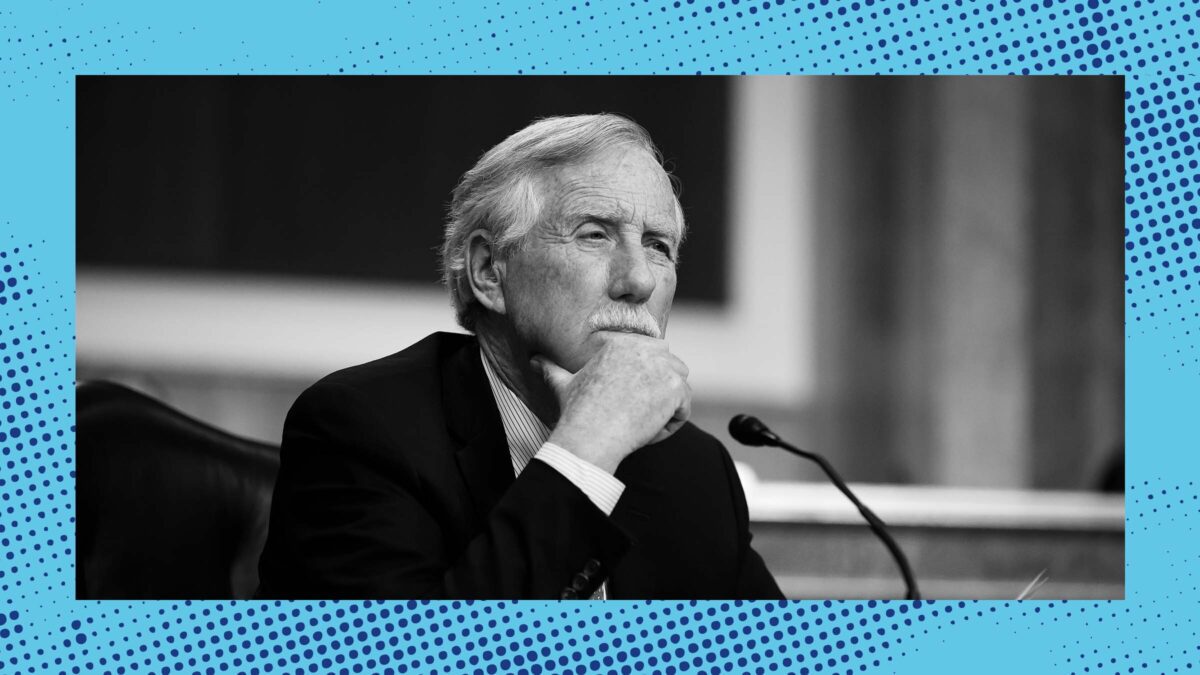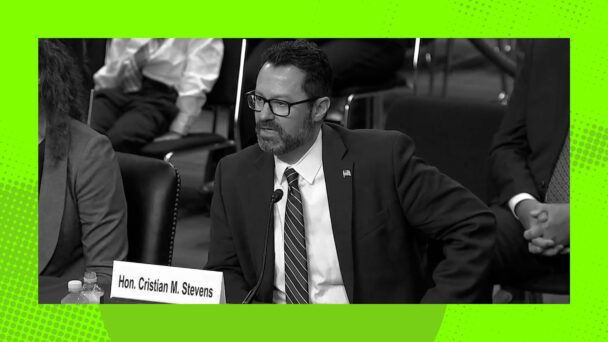On Tuesday, the Republican-controlled Senate narrowly voted to confirm Josh Divine and Cristian Stevens to a pair of district court vacancies in Missouri. Divine, a 35-year-old anti-choice activist who once explained that Christians are “obligated ethically to impose their beliefs on others,” is now a federal judge who could start hearing cases as soon as next month.
Both confirmations, for the most part, proceeded along party lines. Republican senators John Neely Kennedy, Mitch McConnell, and Markwayne Mullin did not vote, but all 50 of the remaining Republicans voted to confirm both nominees. In Stevens’s case, meanwhile, Senate Democrats were united in their opposition: All 47 members of the caucus voted no.
Divine, however, fared slightly better: Maine Senator Angus King, an independent who caucuses with the Democrats, decided to vote yes on Divine—the first time that any member of the caucus has voted to confirm one of President Donald Trump’s second-term judicial nominees. This makes King, who called the Supreme Court’s 2022 decision to overturn Roe v. Wade a “dangerous, blatantly political ruling that will rob millions of women of the fundamental right to make decisions about their own health, safety, and lives,” the only Democrat to sign off on a self-described anti-choice “zealot” who has argued for a ban on abortion with no exceptions for rape. As they did with Stevens, the other 46 members of the Democratic caucus voted no.


In the hours that followed, as people sensibly wondered why in the world a pro-choice senator elected to throw his support behind a lawyer who helped lead the conservative legal movement’s attack on the availability of medication abortion, King’s office was silent. Further complicating matters was the fact that King had voted against Divine in a procedural vote on the nomination just last week. Candidly, I found this flip-flop so bizarre in the moment that I started to wonder if King, who turned 81 earlier this year, had confused Divine for Stevens on the Senate floor, and inadvertently flashed the thumbs-up at the wrong moment.
But on Wednesday morning, Law360’s Courtney Bublé reported that this was no accident: King apparently decided to vote for Divine after speaking with Missouri Republican Senator Josh Hawley, for whom Divine worked as a deputy back when Hawley was Missouri’s attorney general. This private conversation, King told Bublé, had “convinced” him that Divine “would be a capable judge.” (King’s office did not respond to multiple requests for comment for this story. I will update it if I hear back after publication.)
During the first Trump administration, King’s record of opposing judicial nominees was solid, if not spectacular: Although his 100 nay votes weren’t close to, say, Massachusetts Senator Ed Markey, who led the caucus with 159, King still voted to reject nominees at roughly the same clip as liberal stalwarts like Rhode Island Senator Sheldon Whitehouse (98) and New Jersey Senator Cory Booker (96). On the other side of things, King voted to confirm 134 of Trump’s 234 first-term nominees. This is both a lot, and also fewer than, for example, Connecticut Senator Chris Murphy and Virginia Senator Tim Kaine (136 and 135, respectively).
King’s decision to cave this early in the second Trump administration—and in service of perhaps the most unabashed extremist judge this White House has managed to cough up—would be disappointing under any circumstances. To do so as some kind of personal favor to Josh Hawley, a thirsty dunce who was defending the January 6 rioters immediately after fleeing in terror from them, is downright embarrassing. Already, Trump has made clear that his primary qualifications for judicial nominees are, in order, personal loyalty to his agenda, skepticism of the 2020 election results, and an unquenchable thirst for fighting culture wars from the safety of the federal bench. If a chat with the wallet inspector is all it takes to persuade Angus King to confirm a Hawley protégé whose ideological agenda he ostensibly opposes, I shudder to imagine what else King could be convinced to vote for with a little buttering up.
Update: On Thursday, a day after this article was published, King told Jen Bendery and Igor Bobic of HuffPost that he’d made a “mistake” by voting for Divine. “I took Josh Hawley’s advice,” King said. “In retrospect, I think it was a mistake, from what I’ve learned about Mr. Divine since. But sometimes, you rely on your colleagues.” King added that he was “not fully” aware of Divine’s anti-choice record before voting to confirm him.
The bad news for Senate Democrats, of course, is that they simply do not have the votes to stop this parade of reactionary ideologues from getting confirmed to life-tenured judgeships. The good news for Senate Democrats is their task for the next 16 months is fairly straightforward: hold the line on nominees, and hope to pick off enough Republicans to prevent at least the very worst picks from getting the promotions they seek.
But King’s credulous defection here reveals just how enamored some Democrats are with occasional performances of bipartisanship, and how thin the caucus’s commitment to the people whose interests it claims to represent can be. No serious pro-choice elected official should believe that Josh Divine has any business being a federal judge. But if his old boss pulls you aside and tells you he’s a good guy—well, it’s not like Angus King will ever be personally affected by Divine’s rulings. Why spend too much time thinking about anyone else?





